
Audience Navigation
Utility Navigation
Student Blogs
HaMakuya
Leading up to our arrival in HaMakuya, we all experienced varying degrees of anxiety over what it would be like. We knew Western privileges such as electricity and reception would be lacking, but we were unsure what the bathrooms and showers would be like. We knew only that we were staying in tents at a place called Tsulu Camp. At one point, the tar road ended and we found ourselves barreling down extremely rocky dirt roads. With everyone in our game drive vehicles jostling around and bumping into each other, our nerves spiked and waned as the turbulent ride continued for an hour. We came to the end of a road and hopped out into the hottest, driest heat we had ever felt and found ourselves surrounded by bright orange dirt. We made our way towards a large covered area and realized we were in an African paradise. Our tents were overlooking the Mutale River and the view rendered us all speechless 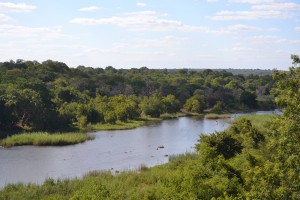 . Our tents were large, permanent zippered tents with 6 mattresses and a bathroom in the rear. The shower had a nozzle hanging directly above your head and a concrete square with a drain in the middle. For all intents and purposes, the shower was open air as the bathroom was simply made up of sticks and mesh. Little did we know that this shower would give us some of the best showers of our lives! As our awe slowly waned, we had a nice dinner and passed out for a comfortable night’s sleep.
. Our tents were large, permanent zippered tents with 6 mattresses and a bathroom in the rear. The shower had a nozzle hanging directly above your head and a concrete square with a drain in the middle. For all intents and purposes, the shower was open air as the bathroom was simply made up of sticks and mesh. Little did we know that this shower would give us some of the best showers of our lives! As our awe slowly waned, we had a nice dinner and passed out for a comfortable night’s sleep.
The next day had everyone up early for a full day of field work. We had two Faculty Field Projects (FFPs) running simultaneously (and a third added during our homestay!), one of which was my crocodile project. While the majority of our group went with the other project, 10 of us geared up for a hike along the mighty Mutale. We hiked about 10 km upstream, collecting habitat information along the way and water samples every 500 m. Our goals were to assess the habitat suitability for crocodiles, survey the current croc population, and interview local fishermen all with the hopes of determining the feasibility of a conservation plan in the area. Throughout our hike, we were forced to cross the river many times (yes…we were crossing the same river in which we were looking for crocodiles) as the river lies in a gorge with massive walls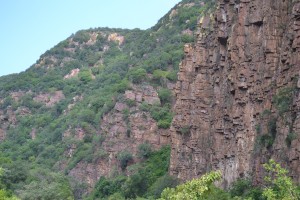 . We crossed in the rapids and it was no easy feat. We all fell in a few times each and struggled to keep all of our data and equipment dry! It was a grueling day, but in one of the most spectacular settings I’ve ever seen.
. We crossed in the rapids and it was no easy feat. We all fell in a few times each and struggled to keep all of our data and equipment dry! It was a grueling day, but in one of the most spectacular settings I’ve ever seen.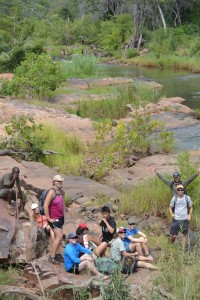
The following day, I went out with the other project to conduct interviews with the local people about their water use. In Hamakuya, water is the single most pressing issue. I could go on for ours on this topic, so if you’re interested I’d love to tell you more about it. In short, many of the sub-villages of Hamakuya have communal taps from which residents can get water. Sounds great, but the trouble is, more often than not, these taps are not working or are only turned on once a week, sometimes for only a few hours. This leaves residents to supplement by purchasing water from donkey carts who fill 25 L water containers at a hand pump or to travel the log distance to the hand pump themselves. Interviewing the people here was one of the most spectacular, enlightening experiences I’ve ever had. In the US, if you walk onto someone’s property with a clipboard and start to ask for a few minutes of your time, you are often met with annoyance and blown off immediately. Here, you walk through the gate to a homestead and are welcomed with open arms as they scramble to bring you chairs and mats to sit on before you’ve even stated the reason of your visit. It was amazing to experience such a warm, inviting atmosphere where people are more than happy to sit with you and answer your questions. The day I participated in this project we visited a town called Musunda 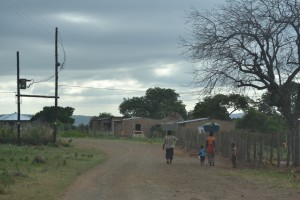 and Mbuyuni
and Mbuyuni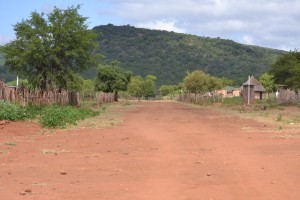 . When we sat down for lunch in Mbuyuni, we instantly found ourselves surrounded by a throng of children screaming “Makuwa!” “white things” in Venda. We amused them and ourselves by taking pictures and throwing around a pebble
. When we sat down for lunch in Mbuyuni, we instantly found ourselves surrounded by a throng of children screaming “Makuwa!” “white things” in Venda. We amused them and ourselves by taking pictures and throwing around a pebble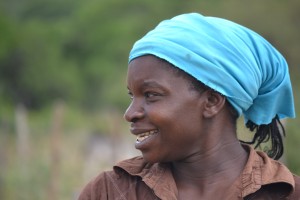
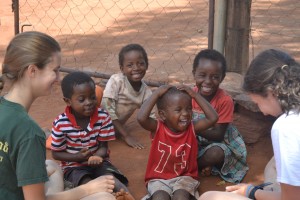 .
.
I apologize for the long post, but this last two weeks has been choc full of so many great moments! As soon as I get a few more pictures from my fellow students, I will tell you all about my homestay in Khavambe , a beautiful town tucked in lush, green hills.
